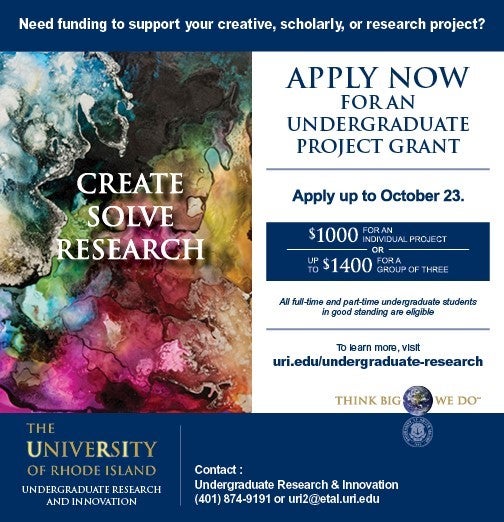KINGSTON, R.I. – Oct. 3, 2023 – George Richter, an English major with a focus on literature, is getting a chance to explore something a little far afield. He’s managing the production of a CD of music.
In a studio in North Kingstown, the University of Rhode Island senior is overseeing edits and production for the recording. He’s handpicking and hiring professional technicians. He’s developing a schedule that will deftly move the recording from the mixing stage and mastering to a finished product.
“A great love for writing and recording music drove me to pursue this project,” said Richter, who lives in West Kingston, “coupled with a lifelong value in the immersive experience of digesting music in the long-play format of albums on CD or 12-inch vinyl records.”
But the opportunity for him to pursue this project comes thanks to the University of Rhode Island’s Undergraduate Project Grant program, which provides funding to about 100 students each academic year. Overseen by URI’s Academic Innovations Group and the Office of the Provost, the program provides grants of $1,000 for an individual project and up to $1,400 for group projects of up to three students. The Undergraduate Project Grant program is currently seeking applications for student-run research or creative or artistic projects. The deadline to apply is Oct. 23.
Across URI, there are many opportunities for students to take part in research projects—from projects under the direct supervision of a professor or researcher, to college-run fellowships, to larger programs funding research opportunities for undergraduates in the STEM fields.
“URI knows that being involved in independent scholarship is tremendously valuable to students,” said Graham Forrester, director of undergraduate research and a professor in natural resources science. “It helps them see themselves as future scientists, artists and scholars.”
The Undergraduate Project Grants widens that field even more—providing funding not only for STEM and engineering research projects but also to those in the humanities, arts and music.
“While there are many opportunities for STEM and engineering students to get involved in faculty-led research on campus, this program is open to students from any major and encourages student-led projects,” said Forrester.
“The Office of Undergraduate Research is able to cast a wider net on campus than the other programs, which gives us the ability to fund the students in those disciplines that do not have access to other funding sources, such as theatre, art, music, and English. Even disciplines like landscape architecture, kinesiology, and psychology,” added Carolyn White, program coordinator for the Academic Innovations Group.
Last spring, the undergraduate grants enabled a jazz quartet to compose, arrange and professionally record an album; bioelectrical engineering students to develop sensors for a “smart mattress” that can track pressure injuries in bed-bound patients; and supported the creation of a podcast on the environmental impacts of art.
It also provided funding to Richter and Violet Johnson.
Johnson, a senior double majoring in political science and history, used her grant to fund independent research on campus evangelism in the 1950s through 1970s in Rhode Island with a focus on URI, looking at how it compared nationally.
“I believe that campus evangelism in the 1950s through ’70s is key to understanding the shape and aesthetic of modern American conservative politics,” said Johnson, who added there is also no formal scholarly research currently on Rhode Island evangelism during that period.
The Providence resident said the funding helped with attaining the research material she needed, including paying for travel to archives—such as Wheaton College near Chicago—to find the records of some organizations, and purchasing relevant books.
“As a history major, this project is a chance for me to put all of my research skills and practice to the test,” said Johnson, who hopes to publish her research in an undergraduate research journal and present it at a conference. “More than even my capstone, it works as proof of my skill as a researcher and a major step in my journey to become a historian.”
Richter said the funding was instrumental to his project, especially covering the hiring of a sound engineer with the skills for the project. Also, while it was outside his major, the project enabled him to use his writing skills to support his grant proposal, along with communicating with professionals and independent contractors.
“My ability to have a platform as a humanities major speaks to the important work being done by the Office of Undergraduate Research to diversify the disciplines which they consider for and ultimately award funding,” he said.
“The project grants are instrumental in supporting students,” added Johnson. “It gives us the chance to explore areas of interest and foster both career and personal growth. For students of different economic backgrounds, this grant is key to creating equity in education.”

